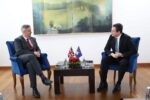Internationally renowned historian Oliver Jens Schmitt was a guest at the International Seminar on Albanian Language, Literature, and Culture on Monday.
In a lecture titled “Pristina and Kosovo in the Late Ottoman Period – The Perspective of Austro-Hungarian Diplomats,” held in a packed hall at the Rectorate of the University of Pristina, Schmitt discussed the Ottomanization of the Albanian people in this region. Schmitt spoke about the life of the Albanian population in Kosovo during the Ottoman occupation, noting that they left almost no written records from that period. As a result, he said that important sources for this period come from Austro-Hungarian diplomats who were then a major power pursuing their interests in the Balkans.
The historian explained how the Ottoman rulers did not allow the Albanians in Kosovo to use their language and how the population at that time lacked a representative to provide their perspective on that era.
“Albanians, who were mostly Sunni Muslims, were prohibited from developing their written culture, and everything had to be in Ottoman Turkish,” said Schmitt.
He added that the only official newspaper of that time was published in Prizren in Ottoman Turkish and Serbian, not in Albanian.
Schmitt noted that the Ottoman leaders did not recognize Albanian as the language of the people they governed.
This, he said, is one of the reasons why Ottoman sources on the life of that time are “limited,” and why “for many decades there was no local or regional perspective on social and political issues in Kosovo during that period.”
Schmitt spoke about a decline in Albanian culture in Kosovo during that era.
He mentioned that European diplomats created a “network of local informants, often from the Catholic community,” to “analyze the opinions of residents on various issues.”
The academic noted that Vienna had helped shape the Albanian national consciousness.
“There was a very unique Albanian national identity here in Kosovo because the Christian factor was absent,” said Schmitt.
The idea of state formation was “a national importance success,” he said. At that time, Schmitt noted that Albanian territories were divided and “texts advocating the national movement were published by intellectuals, Christians, and Bektashis.” He added that “this gave the impression that others did not play any role, that others did not write.” However, he emphasized that historians should also study the actions of others.








